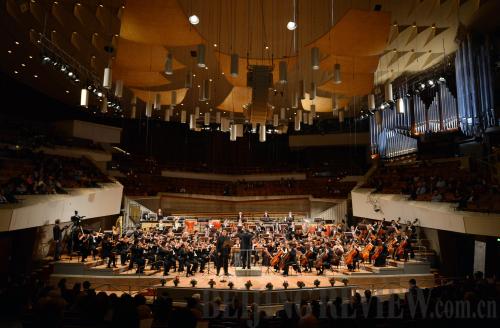|
 |
|
HARMONY: The China National Symphony Orchestra holds a concert in Berlin on September 26 in celebration of the 40th anniversary of the establishment of Sino-German diplomatic relations (MA NING) |

With the signing of a joint communiqué in Beijing on October 11, 1972, the People's Republic of China (PRC) and what was then West Germany officially established diplomatic relations, opening the prelude to the full normalization of relations between the PRC and the West.
Within the last 40 years since the establishment of diplomatic relations, bilateral relations between China and Germany have seen ups and downs, but relations between the two are stronger than ever.
Step-by-step ties
The rapid development of Sino-German relations is closely linked to their historical exchanges and the unyielding national spirit of both nations. As early as the late Ming Dynasty (1368-1644), cultural and economic exchanges had already started. In 1861, the government of the Qing Dynasty (1644-1911) established an official relationship with the German Government. Soon after, Germany, with its thriving national power, was regarded as a highly prized model by pioneers of Chinese modernization. However, as Germany became the focus of two world wars in the first half of the 20th century, Sino-German relations were severely strained and even suspended.
World War II caused Germany to split up. The PRC established diplomatic relations with East Germany shortly after its founding in 1949. Its relationship with West Germany, which followed a pro-Western foreign policy, did not get a favorable turn until the early 1970s when Willy Brandt, Chancellor of West Germany, carried out his New Eastern Policy and China restored its legitimate seat in the UN.
In 1975, Helmut Schmidt became the first chancellor of West Germany to visit Beijing. After China adopted its reform and opening-up policy in 1978, high-level visits between the two countries were frequent and their cooperation greatly deepened. Overall relations between China and Germany saw a big leap during the 1980s and the 1990s despite several political setbacks. In 1993, German Chancellor Helmut Kohl put forward Germany's new Asia policy, centering for the first time on China. The two built the Sino-German partnership of global responsibility in 2004, and the partnership was elevated to a strategic partnership in 2010.
In recent years, both countries have attached more importance to cooperation in the international arena. On platforms such as the UN General Assembly, Group of 20 summits and the Asia-Europe Meeting and through high-level official hotlines, effective cooperation has been carried out in resolving global issues such as the financial crisis, climate change, poverty and terrorism. Since 2006, the two countries' heads of government have made bilateral exchange visits six times. Furthermore, cooperation between the two countries' parliaments was institutionalized in 2005. In June 2011, Sino-German intergovernmental consultations were created, laying a much more solid foundation for the two countries to strengthen their comprehensive strategic partnership.
Economic cooperation
Sino-German economic cooperation has always been an important pillar of bilateral relations. Trade cooperation was already underway even before the establishment of diplomatic ties. After 1972, Sino-German economic cooperation greatly advanced. Currently, China is Germany's largest trading partner outside the EU and its largest source of imports worldwide. Meanwhile, Germany is one of the largest investors and technology suppliers to China. Their trade volume increased from $274 million in 1972 to $169.15 billion in 2011.
|
